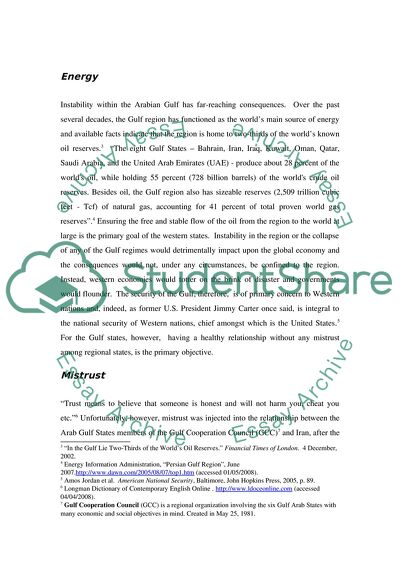
- Home
- Free Samples
- Premium Essays
- Editing Services
- Extra Tools
- Essay Writing Help
- About Us
- Studentshare
- Subjects
- Miscellaneous
- The relationship between the members of Gulf Cooperation Council GCC and the Islamic Republic of Iran
The relationship between the members of Gulf Cooperation Council GCC and the Islamic Republic of Iran - Essay Example

- Subject: Miscellaneous
- Type: Essay
- Level: Undergraduate
- Pages: 4 (1000 words)
- Downloads: 0
- Author: lyric36
Extract of sample "The relationship between the members of Gulf Cooperation Council GCC and the Islamic Republic of Iran"
Gulf regimes have had to respond to these diverse vulnerabilities with traditional defensive measures, military modernization, and, in some cases, renewed commitments to political and economic reform.”2 The above quote, while lengthy, is pertinent to the focus of this study. It very accurately explains the degree to which the security and political structure of the Arabian Gulf is changing and draws attention to the potential for further change. The Gulf states, as indicated, are living a volatile period wherein changes tend towards the revolutionary, as opposed to the evolutionary.
If anything, this highlights the vulnerabilities to which these states are currently exposed and underscores the imperatives of adopting measures which are designed to minimize the threats emanating from these vulnerabilities or, at least, manage their potential for inducing domestic stability within Gulf states and across the Gulf regime. Instability within the Arabian Gulf has far-reaching consequences. Over the past several decades, the Gulf region has functioned as the world’s main source of energy and available facts indicate that the region is home to two-thirds of the world’s known oil reserves.
3 “The eight Gulf States – Bahrain, Iran, Iraq, Kuwait, Oman, Qatar, Saudi Arabia, and the United Arab Emirates (UAE) - produce about 28 percent of the worlds oil, while holding 55 percent (728 billion barrels) of the worlds crude oil reserves. Besides oil, the Gulf region also has sizeable reserves (2,509 trillion cubic feet - Tcf) of natural gas, accounting for 41 percent of total proven world gas reserves”.4 Ensuring the free and stable flow of the oil from the region to the world at large is the primary goal of the western states.
Instability in the region or the collapse of any of the Gulf regimes would detrimentally impact upon the global economy and the consequences would not, under any circumstances, be confined
...Download file to see next pages Read More
- TERMS & CONDITIONS
- PRIVACY POLICY
- COOKIES POLICY